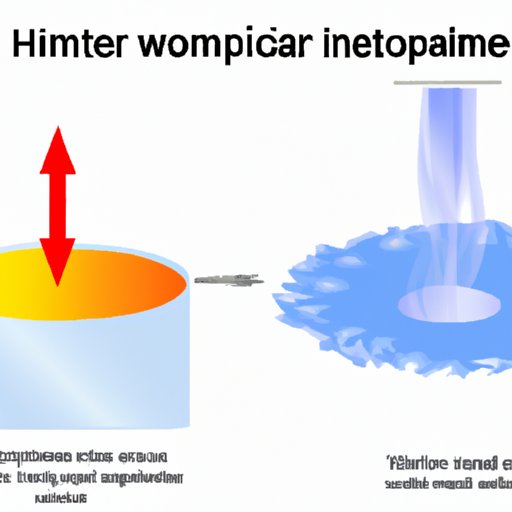Introduction
Have you ever been in a rush to make ice and tried filling your ice trays with hot water thinking it would freeze faster? You may have been surprised to find that your hot water actually froze faster than the cold water in the tray. This strange phenomenon has puzzled scientists for centuries and has given rise to many myths and misconceptions. In this article, we will explore the science behind hot water’s fast freezing and debunk some of the common misconceptions surrounding it.
The Mpemba Effect: Explaining Why Hot Water Freezes Faster Than Cold Water
The Mpemba effect is the name given to the phenomenon that occurs when hot water freezes faster than cold water. This effect was named after Erasto Mpemba, a Tanzanian student who, in the 1960s, noticed that ice cream mix froze faster when it was first heated before being cooled down.
Although the Mpemba effect has been observed by scientists for centuries, it has only recently started to receive significant attention. Scientists have attempted to determine what causes the Mpemba effect through various experiments and research studies.
Several theories have been proposed to explain the Mpemba effect. One explanation suggests that hot water loses heat more quickly than cold water, causing it to reach the freezing point faster. Another suggests that dissolved gases in water affect the rate of cooling, with hot water containing less dissolved gas than cold water.
The Science Behind Hot Water Freezing Quickly
Heat transfer is the key concept behind hot water freezing faster than cold water. When hot water is placed in a colder environment, its temperature begins to decrease, and it loses heat to the surrounding air. The rate at which heat is lost is determined by convection (movement of heated particles) and conduction (transfer of heat through direct contact).
Phase transitions, such as boiling and freezing, also play a role in determining the rate at which water freezes. This is because during a phase transition, heat energy is either absorbed or released. When water is cooled below its freezing point, it releases heat energy, which can slow down the rate of cooling.
The amount of dissolved gas in water can also affect its freezing point. When water is heated, the amount of dissolved gas decreases. This can cause hot water to have a lower freezing point than cold water, which results in faster freezing times.
Does It Really Matter Why? Understanding Hot Water’s Fast Freezing
While understanding the science behind hot water’s fast freezing may seem trivial, there are practical implications to this phenomenon. For example, in industrial and laboratory settings, hot water may be used in cooling systems that require fast freezing times to meet production demands.
Hot water can also be useful in everyday life. For example, if you need to chill a drink quickly, adding a small amount of hot water before putting it in the refrigerator may help it cool down faster.
Overall, understanding the science behind why hot water freezes faster than cold water can help inform decision-making in various contexts where rapid cooling is needed.
Hot Water Freezing: Breaking Down the Myths and Misconceptions
There are several myths and misconceptions surrounding the Mpemba effect. One common belief is that the Mpemba effect only works under certain conditions, such as the shape and size of the container used to freeze the water. However, studies have shown that the Mpemba effect can occur regardless of the container used.
Another misconception is that hot water will always freeze faster than cold water. This is not always the case, as the freezing rate is also influenced by variables such as humidity, air temperature, and water impurities.
Temperature is not the only factor that affects freezing time, as the rate of cooling is influenced by other factors such as convection, conduction, and dissolved gases.
An Experiment to Test Whether Hot Water Freezes Faster Than Cold Water
To test whether hot water freezes faster than cold water, you can conduct a simple experiment at home. To do this, you will need two identical containers, a thermometer, hot and cold water, and a timer.
First, fill one container with hot water and the other with cold water. Use the thermometer to measure and record the temperature of both containers. Place both containers in the freezer and start the timer.
Periodically check the temperature of both containers using the thermometer. Record the temperature and time. Once both containers reach the same temperature, stop the timer. Compare the time it took for each container to freeze and determine which froze faster.
The Practical Applications of Hot Water Freezing Faster
The Mpemba effect has several practical applications.
In industrial and laboratory settings, rapid cooling is often required to meet production demands. The Mpemba effect can be used to expedite the cooling process by using hot water in cooling systems.
In everyday life, hot water’s fast freezing can be useful in chilling drinks or freezing food items quickly. It can also be beneficial in emergency situations where rapid freezing is required.
Conclusion
The Mpemba effect has mystified researchers for years, but its practical applications are undeniable. The scientific explanation behind hot water’s fast freezing is centered around heat transfer, phase transitions, and dissolved gases in water. Understanding the science behind hot water’s fast freezing can help inform decision-making in various contexts, and its practical applications can be beneficial both in professional settings and at home.
Next time you need to make ice or want a cold drink, why not try using hot water? Conducting the simple experiment provided in this article can allow you to observe the phenomenon firsthand.
